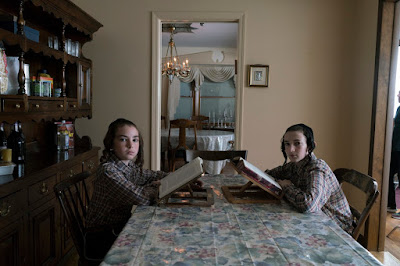History buffs, particularly
film history aficionados, will likely revel in the new documentary opening at New York City's
Film Forum this Wednesday, for it will opens the doors to what (for most of us non-Germans, at least) we have only heard of fleetingly and certainly never seen: those movies -- more than a thousand of them! -- produced by Nazi Germany during the Third Reich. Thanks also to Film Forum, we've seen a couple of documentaries over recent years that showed us some of the especially antisemitic movies the Nazis produced (two fine docs by
Felix Moeller:
Harlan: In the Shadow of Jew Süss and
Forbidden Films: The Hidden Legacy of Nazi Film), but this new one is like a deep dive -- psychologically and historically -- into a particular German cinema that, while plenty antisemitic, is also romantic, crazy, bizarrely funny and really quite sad. And sick.
Written and directed by
Rüdiger Suchsland (shown at left),
HITLER'S HOLLYWOOD: GERMAN CINEMA IN THE AGE OF PROPAGANDA, 1933 - 1945 proves an unveiling of the past that few of us (even, I suspect, younger generation Germans) will not have seen. Out of the hundreds of movies made under the Third Reich (many of which probably never survived) Herr Suchsland has chosen snippets from a very interesting array to tantalize us, as well as put forth some pretty compelling theories regarding
what and
why. What did Nazi Germany dream about?" the director asks early on. Death is the answer. These movies are full of self-sacrifice and an almost mythical, mystical yearning for death.
But, golly, so many of these deaths were somehow "happy" ones -- at least in Nazi cinema. The movie never states this, but I could not help but wonder if Hitler and his closest crew -- Goebbels, Himmler and even Leni Reifenstahl -- somehow knew (and on some weird level even wanted this) that their whole enterprise was doomed from the start. When you dedicate everything to death, rather than life, what the hell are you actually asking for?
One of the many little jolts of recognition that arrive regularly throughout the film comes as Suchsland explains how almost completely devoid of irony and how full of "forced cheerfulness" Nazi movies are. You may remember at that point how often German cinema of the 40s, 50s and 60s was accused of having little sense of humor. Thankfully, that's no longer true (see
Look Who's Back and
Not My Day, for two very funny recent examples.)
Another example: As we watch those "amazing" parades of German youth dressed in military garb, Suchsland sums it all up: "Modern Synchronized movement. And future cannon fodder." Yes, death again. There's even more "happy death," as we examine briefly Hitler's Euthanasia movement. And did you know that the German version of
Titanic, while banned in its home country, was still allowed to be seen in the "occupied" territories?
Among the enormous number of directors, actors, and actresses who parade before us, several stand out, one of whom is described by Suchsland as "a Janus-headed artist stuck between collaboration and resistance," the work of whom Goebbels despised but Himmler loved. According to the filmmaker, one late-in-the-game movie --
Großstadtmelodie -- seems to actually defend the right to privacy and even happiness in the here and now! So take
that, death-lovers!
How the filmmaking changed as Germany became ever-more Nazi, went to world war and then began to lose that war is captured via the parade of films we see. And while, along the way, you may wonder about some of Suchsland's conclusions, it is clear that this filmmaker knows a hell of a lot more about German filmmaking during this period that any of us, so it will be difficult to disagree with many of his conceptions. He makes a generally fine guide to a period of filmmaking in a specific place that many of us may imagine we know but until now, at least, have mostly been flying blind.
Hannah Arendt and her ideas make a helpful, thoughtful appearance or two, helping to stress Suchsland's major point: that a country's people can indeed become -- at least in their own mind and imagination -- the movies that they see.
Hitler's Hollywood proves quite the revelation; for anyone interested in the filmmaking of this time and place, it is not to be missed.
From
Kino Lorber and running 105 minutes, the documentary opens in its U.S. theatrical premiere at New York City's
Film Forum this Wednesday, April 11, for but a one-week-only engagement. It is also scheduled to be seen in Baltimore at the
Parkway Theater, beginning April 27, and in Chicago at the
Gene Siskel Film Center on May 11. Click
here and scroll down to keep abreast of any further playdates, cities and theaters.






















































